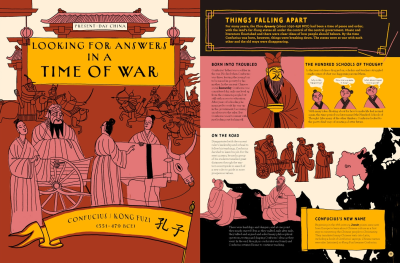I joined the History Girls as a writer of historical fiction for 8-12 year olds, way back in 2012.
And now I write historical non-fiction for 8-12 year olds. It's not as different to writing historical fiction as I used to think. You still do the research - you still get that big grin on your face when you unearth the diamond detail - you're still telling a story. And you're still spending time with compelling characters who quickly become as real, or realer, than your own family. They certainly occupy a lot of brain space.
In Talking History: 150 Years of Speakers and Speeches, the pattern was laid for the collaboration between the writers - Joan Haig and me - and Andre Ducci the illustrator.
Our second book is about philosophy. In Great Minds: 2500 Years of Thinkers and Philosophy we spread the historical net even further.
If you want to talk about philosophy, the 8-12 year old group is the way to go - low on preconceptions, assumptions and prejudices, high on curiosity, energy and questions. Which is perfect for an area of human endeavour based on looking at questions and then looking at answers. Questions like:
What does it mean to be good?
Who am I?
What is time?
How can we tell if something is true?
What makes something beautiful?
And dozens more.
In the book we looked at questions and answers from different countries, cultures and times. And we introduce the reader to the people who have shaped the way we see the world.
Fascinating is an overworked word, but the back stories of these people are just that.
Of course, each story is different, but it was interesting how many of them start with being mediocre at school, described as too shy, only average, messy, female or black or both (and therefore really shouldn't be schooled at all). A goodly number, like Gandhi and Marx, had terrible handwriting, though a notable exception was the Ethiopian philosopher Zera Jacob who made a living by his beautiful calligraphy. As often as not, they came from poverty or lived in war-torn times or experienced colonialism. But not always - there is no template for a philosopher!
Something that shone out for me particularly was how often these philosophers were also polymaths. The specialism of the present day is so sure of itself that it can blind us to how this has not always been the case. Ibn Rushd was also a medical doctor, a musician and an astronomer; Gandhi was a lawyer who also hand-spun cotton; Mary Midgley studied animal behaviour and raised children. Philosophy speaks to every part of life.
P.S. We've had some lovely reviews - thank you! And to learn more about Andre's fabulous work on the book, visit My Book Corner's Meet the Illustrator interview with him here.
Joan Lennon website
Talking History: 150 Years of Speakers and Speeches Templar Books (2022)
Great Minds: 2500 Years of Thinkers and Philosophy Templar Books (2023)
The Slightly Jones Mysteries - Victorian detective stories for 8-12 year olds
The Wickit Chronicles - Medieval adventure stories for 8-12 year olds







Looks brilliant! Kids are *very* open to philosophy and it should be encouraged at every opportunity :-)
ReplyDeleteThanks Anne - it really was fun to write, too!
ReplyDelete